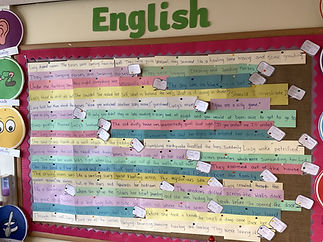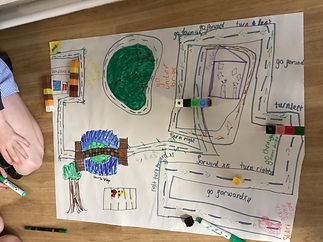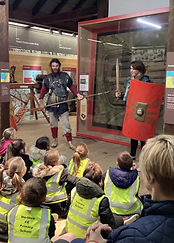Year 4
Welcome to the Year 4 Class Page!
Welcome to the Year Four class page! I am really excited to be working with your children this year. It is my pleasure to watch the children develop and mature over the year and to be part of their learning journey.
We have an exciting year ahead together, with engaging topics and wonderful opportunities. Our trip to Lunt Fort and residential to Oaker Wood are huge highlights. I believe a strong partnership between school and home is vital, so please check our class blog, hosted on Microsoft Sway, regularly for updates, important information and photos. If you have any questions or concerns at any time, please don’t hesitate to email or come and see me and I will do my best to help.
Thank you for your support. I look forward to a fantastic year together.
Warm regards,
Mrs Clipsham
Year 4 Class Teacher

Year 4 Team


Curriculum Overview
English
The Year 4 English curriculum includes engaging texts and topics to help the children improve their reading, writing, spelling, and handwriting abilities, helping them to meet the National Curriculum goals for Year 4.
In Reading, the children will explore a variety of texts, including stories, poems, and non-fiction, to develop their comprehension skills. They'll learn to identify key themes, infer meaning, and discuss character motivations. Our lessons and class novel time aim to encourage a love of reading while enhancing vocabulary and critical thinking. Our class novels for the year will include Llama Out Loud, Stepfather Christmas, The Boy Who Made Everyone Laugh and Charlotte’s Web.
Our Writing units will cover different text types, including narratives, poems, diaries and persuasive writing. Children will practice planning, drafting, editing, and improving their work, focusing on structure, grammar, and creative expression. We also emphasise punctuation, sentence variety, and cohesive paragraphing. Our writing will be inspired by books and poems including The Wolves in the Walls, Still I Rise, The Diary of a Sun King and The Princess and the Pea.
In Spelling lessons, the children will build confidence in spelling by learning common spelling patterns, prefixes, suffixes, and high-frequency words. A variety of activities and exercises help reinforce these skills, with regular practice and fortnightly spelling tests to ensure mastery by the end of Year 4. We will also work on handwriting, focusing on improving neatness, consistency, and fluency. Children will practice joining letters and forming clear, legible script, following the correct letter formations.


Maths
The Year 4 maths curriculum builds on knowledge and skills learned in Year 3 and Key Stage 1, aiming to ensure that the children are confident with number work and problem solving, allowing them to be ready for future challenges.
The children will deepen their understanding of place value, working with numbers up to 10,000. They'll learn to read, write, and order numbers, rounding them to the nearest 10, 100, or 1,000. Understanding place value is crucial as it forms the foundation for all other areas of maths. New algorithms will be introduced for more complex addition and subtraction, including methods for solving problems with up to four-digit numbers. In multiplication and division, the children will build on their prior knowledge, learning more efficient methods for solving larger problems.
Mastering multiplication facts is a key focus in Year 4. By the end of the year, children are expected to know all times tables up to 12 x 12. Times tables knowledge is vital for success across many areas of maths, and children will have regular practice sessions to build fluency and speed. In June, the children will take part in the Year 4 Multiplication Tables Check, which assesses their recall speed for these crucial number facts. As times tables is such a focus for Year 4, we are introducing the 144 club – special recognition for those children who are able to recall their times tables up to 12 x 12 at speed.
Later in the year, the children will extend their work on fractions, learning to recognise and show equivalent fractions, add and subtract fractions with the same denominator, and convert between fractions and decimals. They'll also begin working with numbers involving two decimal places. In measurement, the children will learn to convert between different units of measure (e.g., from metres to kilometres) and solve problems involving perimeter and area. Geometry will include identifying acute, obtuse, and right angles, as well as recognising symmetry and translating shapes. In statistics, children will interpret and present data using bar charts, pictograms, and line graphs.
We will also hold regular Mastering Number sessions, designed to strengthen children's number fluency and mental maths strategies. These sessions will help solidify their understanding of key number facts and problem-solving skills, ensuring they are confident in both basic and complex calculations. Through regular practice, real-life problem-solving, and engaging lessons, we aim to foster a deep understanding of maths and a love for learning.

Science
Our Year 4 Science curriculum is designed to ignite curiosity and develop essential scientific skills. Through interactive experiments, activities, and real-world investigations, we will explore a wide range of science topics.
The children will start by studying plants. They’ll explore the functions of different parts of plants—roots, stems, leaves, and flowers—and conduct experiments to investigate what plants need to grow well, such as light, water, and nutrients. We’ll also look at how seeds are dispersed and how this impacts plant growth.
We will then explore the digestive system of humans, learning about the role of the mouth, stomach, intestines, and other organs in processing food. We will also study the different types of teeth in humans and other animals, learning how diet relates to the shape and function of teeth. This topic will also include an investigation of food chains, with children identifying producers, predators, and prey in various ecosystems.
The children will also explore how sounds are made and how they travel through different materials. They’ll investigate pitch and volume, learning how sound waves are detected by our ears. Experiments will involve creating their own musical instruments to demonstrate how sound can change depending on vibrations and distance.
In our topic on electricity, we will learn about the basics of electricity and electrical circuits. We will build simple circuits using wires, batteries, bulbs, and switches, and investigate which materials act as conductors or insulators. Safety around electricity will also be a key focus.
Later in the year, we will explore the fascinating world of living organisms and how they are classified. We will learn about different groups of animals and plants, including vertebrates and invertebrates, and discover how scientists use observable characteristics to classify living things. The children will also investigate the ways in which habitats can change and the impact this can have on the animals and plants that live there.
We will also get ready for an exciting STEM Week in November, filled with special visitors from the fields of science, technology, engineering, and maths! The children will take part in STEM-themed activities, hands-on experiments, and workshops, designed to show how science is used in real-life careers and innovations. STEM Week is a fantastic opportunity to explore the wider world of science and inspire a love of discovery. Through hands-on exploration, critical thinking, and collaborative learning, we aim to foster a deep understanding and love of science, encouraging children to ask questions and think scientifically about the world around them.




RE
Our Year 4 Religious Education curriculum is designed to help the children explore and understand different beliefs and practices, fostering respect and curiosity about the world’s diverse faiths. We will start with Christianity and explore the world Jesus wants. As part of this unit, we will delve into the Gospels, focusing on the messages of love, peace, and forgiveness that are central to Christian teachings. We will explore stories from the Bible that illustrate these values and discuss how they can be applied in our daily lives.
Next, we will learn about Sikhism, asking ‘how does the teaching of the gurus move Sikhs from darkness to light?’. We will then further our understanding of Sikhism, asking ‘How do Sikhs put their beliefs about equality into practice?’. As part of this, the children will have the opportunity to recreate our own version of the Sikh Langar – a free kitchen. The children will prepare and serve food to the rest of the school – a fantastic experience for all involved.
Later in the year, we will move on to study Judaism, and ask ‘what does it mean to be free?’. This will link with our learning around apartheid in History and Geography, and will give the children opportunity to reflect on the freedoms they are able to enjoy.
Towards the end of Year 4, we will revisit Christianity and the gospels. We will start with looking in detail at the meaning story of the Lost Sheep, and will consider how it feels to lose something or someone, with links to our PSHE curriculum. Finally, we will study the Pentecost, and ask what the impact was when Jesus left.
Our Easter performance will also allow us to gain further understanding of the events of Holy Week and Jesus’ resurrection. Our RE curriculum aims to provide children with a respectful understanding of various religious beliefs and traditions, encouraging them to reflect on their own values and the values of others.
History and Geography
In Year 4, our History and Geography curriculum aims to engage the children with fascinating topics that develop their understanding of the world and the past, with a strong emphasis on map skills, historical figures, and local history.
We begin with our popular ‘Romans’ topic, where the children will get to experience life as a Roman solider on our visit to Lunt Roman Fort. They will use maps to understand the spread of the Roman Empire, as well as considering why the Romans built towns and cities in the places they did. We will look at the power of the Roman army, and spend time focusing on how the Roman Empire impacted Britain, finally considering the Roman legacy and how it still affects our lives today.
We will then explore both the history and geography of South Africa, refreshing our knowledge of continents and learning about latitude and longitude. The children will learn about apartheid and explore the extraordinary life of Nelson Mandela, with a particular focus on his famous speech. We will then consider other inspirational and powerful speeches from history, such as those by Winston Churchill, Martin Luther King and Malala Yousafazi.
Later in the year, our topics will be the ‘Anglo-Saxons’ and ‘Vikings’. We will explore how England changed during the settlement of the Anglo-Saxons and Vikings, and will make comparisons between maps of England then and now. Using our historical skills, we will question the evidence we have from the time and consider how much it is able to tell us. We will explore the exciting stories of Viking gods and goddesses, linking to our writing text ‘Arthur and the Golden Rope’.
Through these engaging topics, our History and Geography curriculum aims to develop children’s understanding of both the wider world and their local area, while also deepening their appreciation of the past and how it shapes our present.




